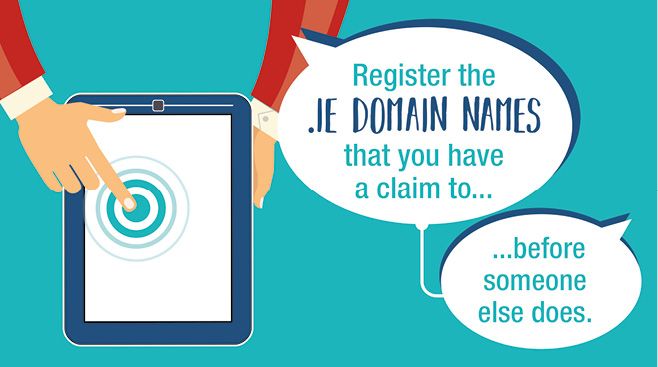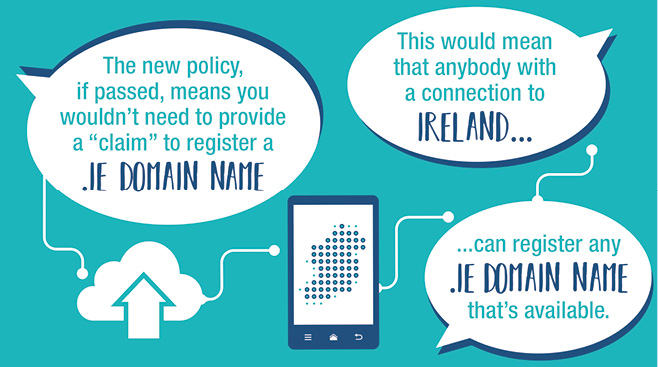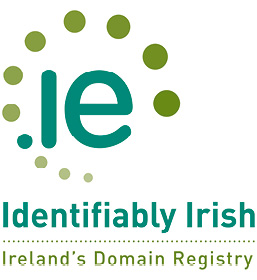Easing dot ie access


IE Domain Registry (IEDR), the company that manages Ireland’s country domain name, is proposing changes to the dot ie (.ie) registration requirements as part of our policy development process, Customer Operations Manager Oonagh McCutcheon writes.
Until now, it has been a requirement to provide a connection to Ireland alongside a claim to the name in order to register a dot ie domain name. The changes proposed by the Registry will remove the requirement to provide a claim to the name. The ‘claim to the name’ refers to the requirement on registrants to prove a legitimate, valid claim when applying for a new dot ie domain. The connection to Ireland however, remains sacrosanct and will be maintained. One of dot ie’s greatest values is that it is ‘identifiably Irish’. A business with a dot ie address is immediately authentic, trustworthy and familiar. For that reason, the requirement to prove a connection to the island of Ireland will not be going away.
Why is this being proposed?
Our objective is to make it easier and faster to get a dot ie, and to make it more accessible to business and the wider community. There is a growing demand for dot ie domains and we want to facilitate Irish businesses in the global e-commerce marketplace.
• We want to make it easier and faster for those with real Irish connections to get a dot ie. There is a perception that dot ie domains can be difficult to get and that the process can be bureaucratic. Despite improvements in the process of getting a dot ie domain over the years, this legacy impression still exists in some quarters. There is anecdotal evidence to suggest that this leads to some applicants deciding to use .com instead.
• We want the dot ie namespace to become more accessible to citizens, clubs, communities and businesses. A dot ie domain shows Irish consumers that the business is local and it shows the world that the business is Irish.
• We want to grow dot ie, especially with Irish small office/home office/micro businesses. This is a cohort that remains stubbornly offline. Our latest Digital Health Index, published in December 2017, shows that almost one in five Irish SMEs does not have any digital presence whatsoever. This is despite research which shows that businesses with a website will earn €24,000 per annum more if they have a website (research based on a survey of 500 Irish SMEs conducted by Ignite Research in March 2017). Small businesses in Ireland are losing sales to overseas competitors and this need not be the case.
• We want to remove the ‘claim’ requirement, as applicants cannot prove future ‘claims’. Many new start-up businesses are online-first and often do not have a physical presence and indeed may never have one. This means they don’t have the ability to verify a claim through sources such as the CRO, revenue VAT numbers or EU trademark databases.
• We want to remove restrictions on domains that reflect a person’s name, nickname or pen name. We believe that now is the right time to remove the claim, so that those citizens and residents with real Irish connections can get any available dot ie domain they want, without delay.
• We know there is a growing demand for dot ie domains. As discussed in our latest dot ie Domain Profile Report, which analyses the make-up and geographical spread of dot ie domain registrations, there were 230,611 dot ie domains in the database as of 30 June 2017. In the first half-year period of 2017, there were 20,255 new dot ie registrations, up 11 percent on the same period last year.
• We want to respond to changing customer demands and expectations where instant service online has become the norm. The increased digitisation of key services such as government, financial and banking services has created an expectation of frictionless customer experience.
What is remaining the same?
Dot ie domains will still be reserved for people who can prove a legitimate connection to Ireland. This can include Irish citizens and residents, Irish businesses and overseas companies trading with Ireland. Those who cannot show a real connection to Ireland will not be able to get a dot ie domain. Our standard check on the identity of the applicant will still remain, ensuring that dot ie remains one of the most secure domains in the world.
Who has been involved in this proposal?
The policy change has already been approved in principle by IEDR’s Policy Advisory Committee (PAC) and other key dot ie domain stakeholders, and by the IEDR Board of Directors. Every registry in the world has a set of policies which determine how it operates and engages with its stakeholder community. Ireland has developed a policy development process (PDP) which is designed to be bottom-up and consensus-driven. This means that any stakeholder can request a policy change and, if there is consensus among stakeholders, the policy change can be implemented. Many policy changes involve a public consultation phase. In this case, the public consultation took place from 28 August 2017 to 30 September 2017. The consultation attracted a high level of interest, higher than any other previous consultation run by the Registry. There were 117 responses to a range of questions. A majority of respondents was in favour of the change, believing it was a positive step and that it would make registering a dot ie easier and faster. The potential to allow any variation of a person’s name was also strongly supported. Respondents agreed that the safety of the namespace would not be adversely affected; that the connection to Ireland requirement will deter international cyber squatters; and any potential future disputes can be handled through existing and proposed mechanisms. This includes the IE Dispute Resolution Policy, the provisions of the legal Terms of Service, and the IE Registration & Naming Policy. Separately, the Policy Advisory Committee is also reviewing the introduction of an Alternative Dispute Resolution Process. This will offer a faster and more affordable way to mediate disputes on dot ie domain registrations.
Is there anything you should be concerned about?
 Businesses and organisations in particular, should make sure that they secure the domains they want before the rules change. They currently have an advantage, in that they have a claim to the name allowing them to get the names they want. The only way for them to ensure that no one registers a domain they want or need is to register it.
Businesses and organisations in particular, should make sure that they secure the domains they want before the rules change. They currently have an advantage, in that they have a claim to the name allowing them to get the names they want. The only way for them to ensure that no one registers a domain they want or need is to register it.
Dot ie domains are registered on a first come, first served basis to anyone who meets our registration requirements. If the proposed policy change is approved, anyone who can show evidence of their connection to Ireland will be entitled to register any dot ie domain name they wish, as long as it is available.
Policy makers should not be concerned as dot ie will still be reserved for those with Irish connections and will remain one of the safest domains for businesses and citizens. Our process drastically reduces the chances of fraudsters and phishers using a dot ie address for criminal purposes. It is simply too much effort and expense for them, and too easy to get caught out. Unlike a dot com address, where the registration is immediate and unchecked, every dot ie registrant will still need to prove their connection to Ireland

before their application is approved, so for individuals this would involve photo identification, such as an Irish passport.
When is this change expected to happen?
It is envisaged that there will be a lead-in time of a number of months to allow members of the public, the business community, the public sector and other relevant bodies to become aware of the change and its likely impact. The likely date for the change to be implemented is Q1 2018. There will be an extensive public awareness campaign in the lead up to the change.
For more information:
E: liberalisation@iedr.ie
W: www.iedr.ie/liberalisation






